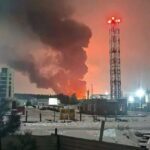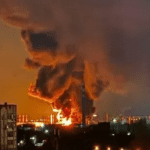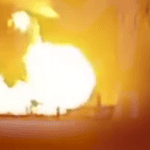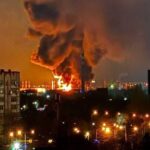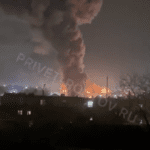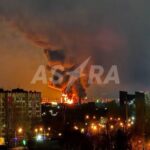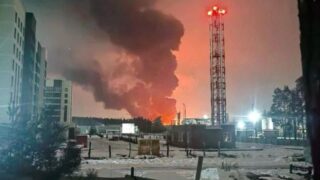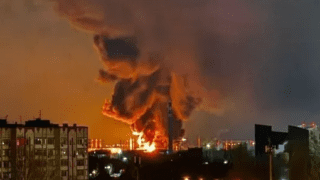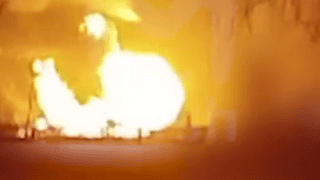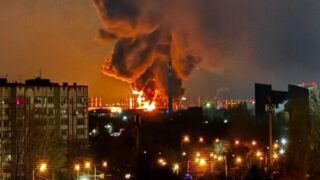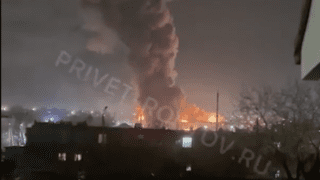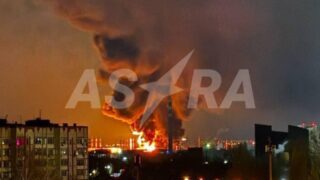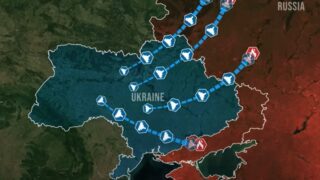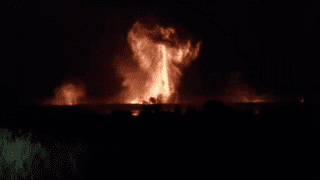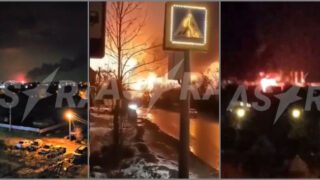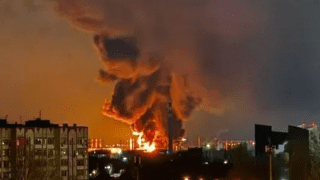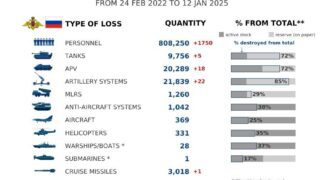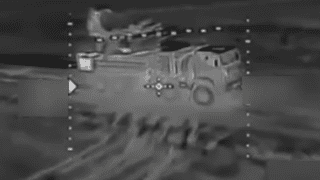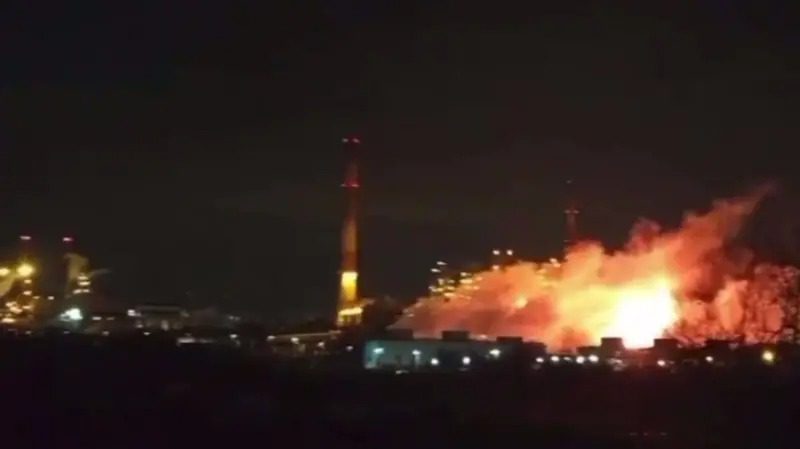
Ukraine’s largest air assault targets fuel and defense industries in 12 Russian regions
Ukraine launched its largest yet drone operation of 2025 overnight on 14 January, targeting multiple Russian regions with strikes against military-industrial facilities, oil refineries, and ammunition storage sites, according to multiple sources. The attack also included missile strikes.
Last year, Ukraine intensified its long-range drone attacks against the military and fuel facilities within Russia, significantly disrupting fuel and ammunition supplies crucial for the Russian military. Many of such attacks targeted Russian bomb warehouses at airbases, ammunition depots, fuel processing and storage facilities deep inside Russia. Meanwhile, Russia continues its relentless nightly drone, missile, and bomb attacks on Ukraine, with strikes intensifying in recent months.
Ukraine’s Center for Countering Disinformation head Andrii Kovalenko said targets in Russia’s Engels, Saratov, Kazan, Bryansk, and Tula included weapons component manufacturing plants, oil refineries, fuel depots, warehouses, and air defense facilities.
A source in Ukraine’s Security Service (SBU) told BBC News Ukrainian that the strikes hit the Aleksin Chemical Plant in Tula Oblast, ammunition warehouses at Engels airfield in Saratov Oblast storing FAB “dumb” bombs, KAB guided bombs, and cruise missiles, the Saratov oil refinery, as well as the Bryansk Chemical Plant.
“Russia’s leaky air defense continues to let strikes through against strategic objects of the Russian economy. Oil refineries, fuel depots, weapons component manufacturing plants – everything without which the Russian army won’t be able to fight intensively, and the Russian economy won’t be able to maintain steady military needs,” Kovalenko stated.
Saratov and Engels
Local authorities reported damage to industrial facilities in Engels, Saratov Oblast. According to local media outlet 164.ru, a fire broke out at the Saratnefteprodukt oil refinery in Saratov, though authorities have not confirmed this information. Telegram channels, citing local residents and publishing videos of a massive fire, reported that the Kristall oil depot in southern Engels was targeted again, after burning for five days from a previous strike.
Russian news Telegram channel Astra reported that two industrial enterprises were damaged in the Saratov region during the drone attack, according to the governor. The channel verified that the Saratov oil refining plant, one of Russia’s oldest refineries formerly known as Kreking and now part of Rosneft, was hit. The facility processes Urals crude oil and Saratov deposit oil via pipeline, as well as oil from Orenburg deposits delivered by rail and water transport.
Ukraine’s 14th Separate UAV Forces Regiment reported successfully striking the Engels-2 military airfield infrastructure, where Russia’s Tu-95MS and Tu-160 heavy bomber aviation division is based. The unit confirmed hitting fuel tanks containing aviation fuel for Tu-160 aircraft at the Kristall fuel depot in Engels, stating that “a multi-day complex operation to reduce enemy strategic aviation capabilities has been completed.”
Euromaidan Press has reported separately on the successful attack on the Engels-based fuel depot, serving as a “gas station” for Engels-2 bomber airbase:
Kazan and Tatarstan
The press service of Tatarstan’s head reported that a gas tank caught fire at 5:20 a.m. local time in Kazan’s suburbs following a drone attack, BBC Russian says. According to Vechernyaya Kazan, citing anonymous sources, the drone hit the Kazan liquefied gas base, with at least three tanks catching fire.
Astra reported that the attack targeted Gazprom’s liquefied gas facility in Kazan’s Moskovsky district. Astra says several explosions occurred in Kazan’s Aviastroitelny district, where witnesses reported drones being shot down near the Kazan Aviation Plant, one of Russia’s largest.
Drones also targeted a Transneft oil pumping station with a 650 million cubic meter reservoir park in Almetyevsk, Tatarstan. The Taneko oil refining enterprise in Tatarstan’s Nizhnekamsk also raised an alarm and evacuated employees.
Tula Oblast
Tula Oblast Governor Dmitry Milyaev reported at least 17 drones targeting the region. In Aleksin, drone debris damaged several vehicles and outbuildings, he claimed. According to Astra, drones targeted at least three factories in the region, with drone debris fell on the Aleksin Chemical Plant territory, which supplies products to powder, cartridge, and ammunition manufacturing plants for the Russian army.
The attacks also targeted the local Aleksin thermal power plant, damaging windows in one of the workshops, and the Tulachermet enterprise in Tula, one of the largest cast iron producers and suppliers. Astra reported that one military serviceman from military unit 51858 from Moscow Oblast was hospitalized with shrapnel wounds.
Bryansk Oblast
Ukraine’s Unmanned Systems Forces Command confirmed striking the Bryansk Chemical Plant in Seltso, describing it as a “strategic facility” of Russia’s military-industrial complex that produces gunpowder, explosives, and rocket fuel components. The command stated that drones successfully distracted Russian air defense, opening the way for missiles to hit primary targets, while long-range UAVs destroyed substations and other important infrastructure after the missile strike.
Euromaidan Press has reported separately about this attack:
Explosives factory targeted allegedly with ATACMS in Russia’s Bryansk Oblast
Despite multiple videos from Bryansk Oblast showing no doubt ground explosions rather than air explosions typical for successful interceptions, Russia’s Defense Ministry claimed that all air weapons were allegedly shot down in the region:
“An attempt was made tonight from Ukrainian territory to launch a missile strike against facilities in Bryansk Oblast using six United States-made ATACMS operational-tactical missiles, six UK-made Storm Shadow air-launched cruise missiles and 31 unmanned aerial vehicles of the airplane type. In the course of the anti-air combat, all air attack vehicles were shot down by air defense calculations. There were no casualties or injuries,” the Russian MoD wrote.
Russian claims
The Russian Defense Ministry, known for its repeatedly unrealistic claims throughout the war, claimed in an other report shooting down six ATACMS tactical missiles, eight Storm Shadow cruise missiles, one HIMARS rocket, and 180 drones, including 146 outside the “special military operation” zone.
The “special military operation” is Moscow’s official euphemism for its invasion of Ukraine, while the area outside it means basically Russia.
Over the Black Sea, the Russian Defense Ministry claimed downing two more Storm Shadow cruise missiles. The Ministry’s claims remain unconfirmed.
Rostov Oblast’s acting Governor Yury Slyusar stated that 14 drones were “destroyed and suppressed by electronic warfare means.” Oryol Oblast Governor Andrei Klychkov claimed intercepting 17 Ukrainian drones, while Samara Oblast reported allegedly downing 15 drones.
According to Liga, Russian authorities also reported the following interceptions: “several” drones over Voronezh, another over Volgograd Oblast, four in Kursk Oblast, three in Bryansk Oblast, and two in Krasnodar Krai.
In Belgorod Oblast, Governor Vyacheslav Gladkov claimed Ukrainian forces attacked eight districts with at least 30 drones of various types, with some allegedly intercepted by local air defenses.
Related:

